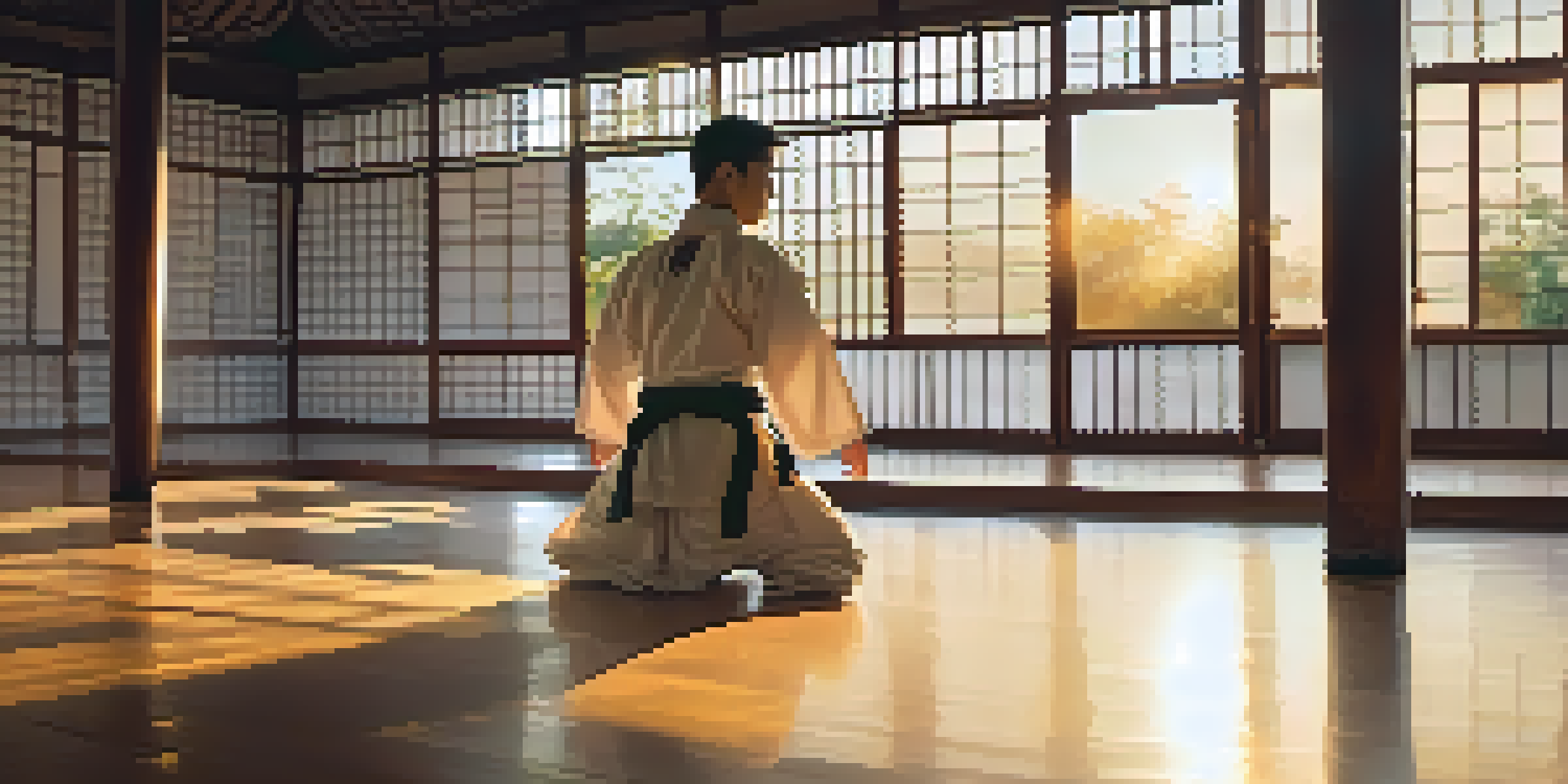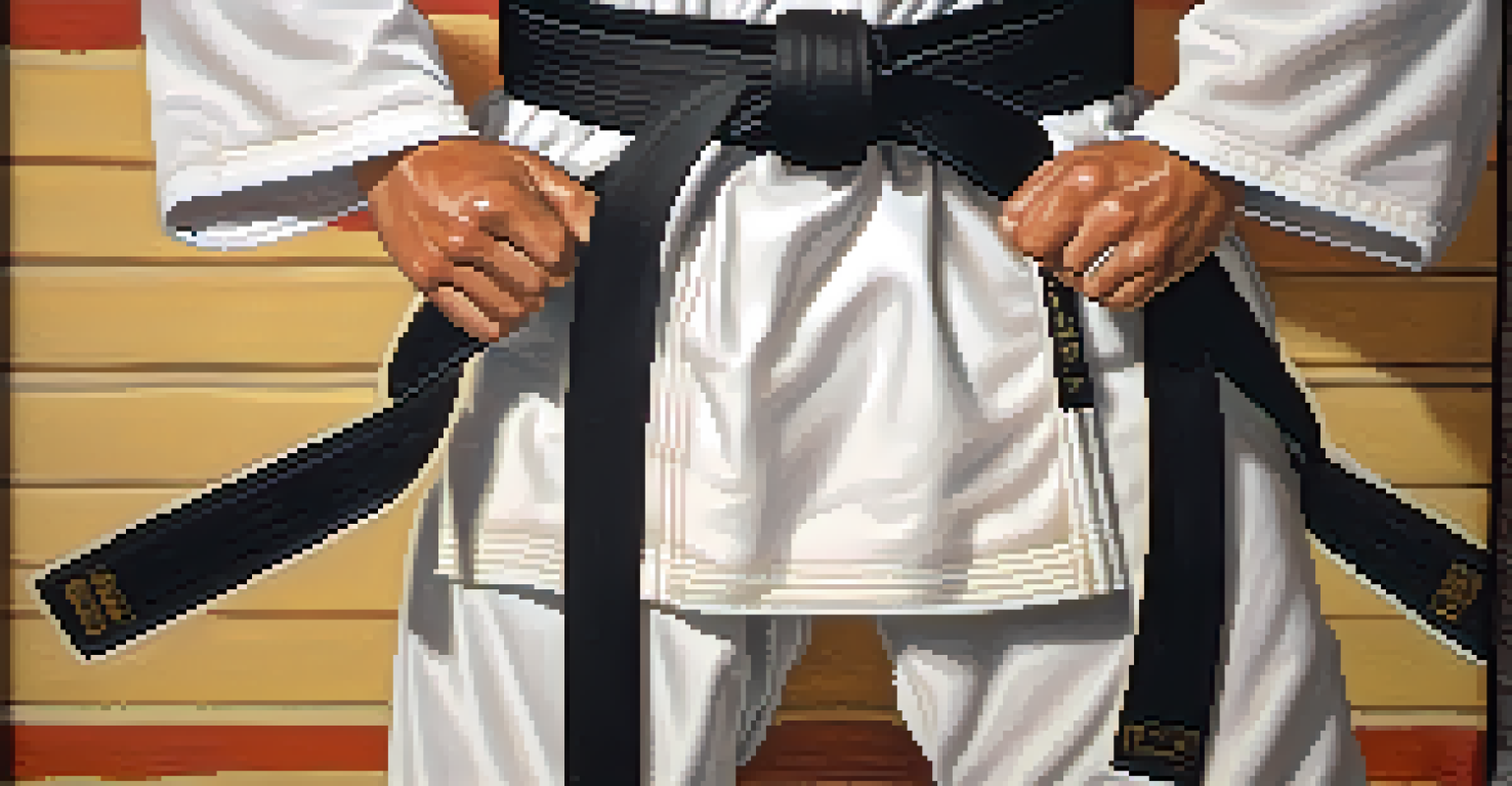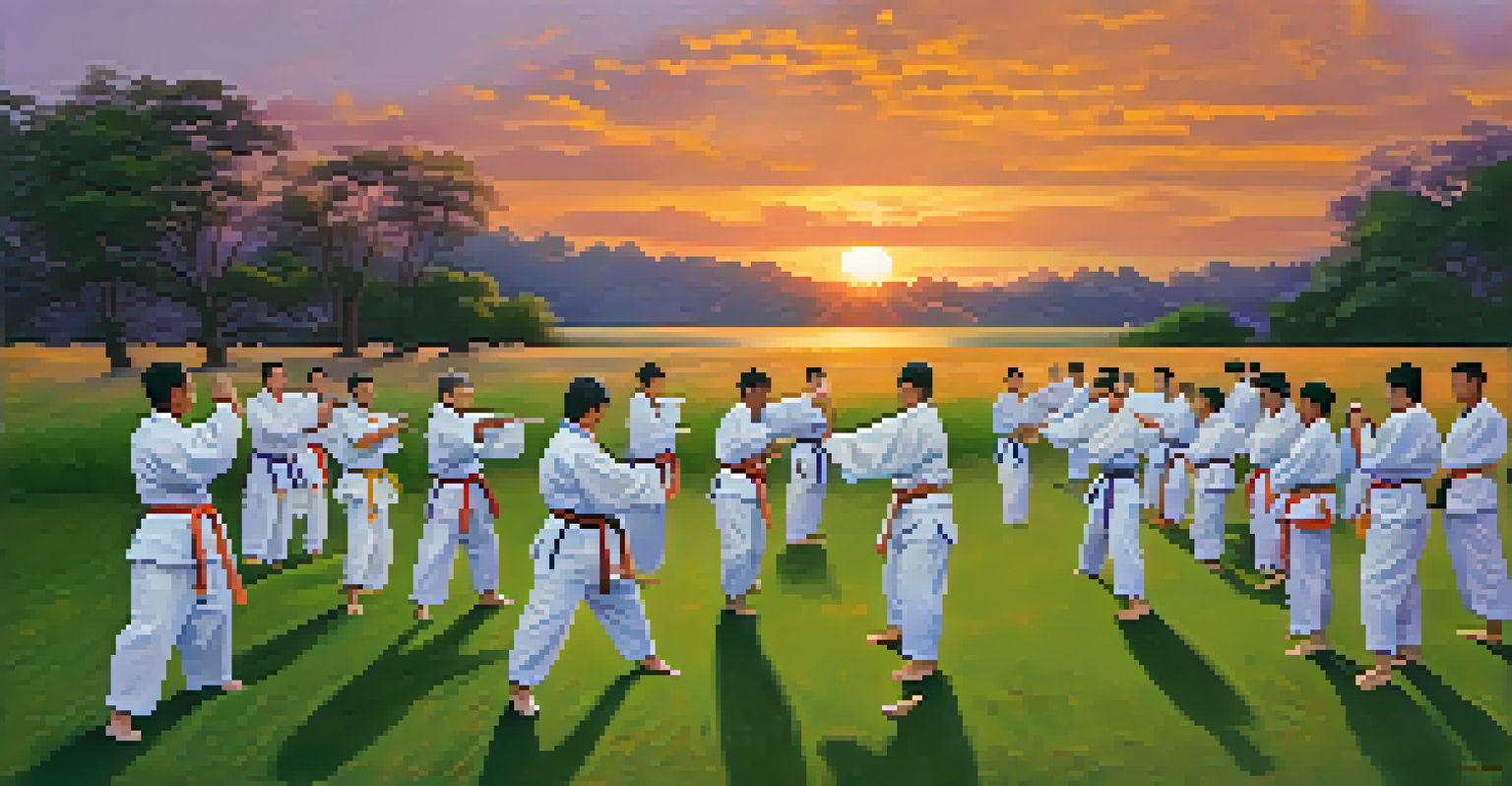The Role of Discipline in Martial Arts and Recovery

Understanding Discipline in Martial Arts
Discipline in martial arts isn't just about following rules; it's about cultivating a mindset that values commitment and perseverance. Practitioners learn to push through discomfort and setbacks, which builds resilience. This mental fortitude is essential not only for mastering techniques but also for handling the ups and downs of life outside the dojo.
Discipline is the bridge between goals and accomplishment.
For instance, a martial artist who practices daily, even when motivation wanes, demonstrates discipline. This consistent effort leads to gradual improvement, showcasing that discipline is the backbone of success. It's this dedication that separates the casual practitioner from the true martial artist, who sees training as a lifelong journey.
Moreover, discipline fosters respect—both for the art and for fellow practitioners. A disciplined mindset encourages humility, as one learns that mastery is a continuous process. This respect is crucial, as it creates a supportive community where everyone can grow and thrive together.
The Impact of Discipline on Training
Training in martial arts requires a structured approach, and discipline is what keeps practitioners on track. Regular training sessions, repetition of techniques, and sparring are all essential components that benefit from a disciplined schedule. Without this commitment, progress can stagnate, and motivation may dwindle.

Imagine a martial artist preparing for a competition. They adhere to a strict regimen, balancing physical training with mental preparation. This discipline not only sharpens their skills but also enhances their confidence, allowing them to perform at their best when it matters most.
Discipline Builds Resilience
Martial arts discipline fosters mental fortitude, helping practitioners navigate challenges both in training and in life.
Additionally, discipline extends to the mental aspects of training, such as focus and concentration. A disciplined practitioner learns to block out distractions and remain present during training. This level of focus can lead to more effective learning and retention of techniques, ultimately improving overall performance.
Discipline and Injury Prevention
Injuries are an unfortunate reality in martial arts, but a disciplined approach can help minimize their occurrence. By adhering to proper techniques, warming up adequately, and listening to their bodies, practitioners can reduce the risk of injury. Discipline in these areas ensures that training remains safe and effective.
The difference between a successful person and others is not a lack of strength, not a lack of knowledge, but rather a lack in will.
Additionally, a disciplined mindset encourages martial artists to recognize their limits. Pushing beyond one’s capabilities can lead to injuries, so understanding when to stop is crucial. This awareness fosters a culture of safety within the training environment, allowing everyone to practice without fear of harm.
For example, a disciplined practitioner will take the time to stretch and condition their body, making them less prone to strains and sprains. This proactive approach not only enhances performance but also contributes to a longer, healthier training career.
The Relationship Between Discipline and Recovery
Recovery is a vital component of any martial arts training regimen, and discipline plays a key role in this process. A disciplined approach to recovery means knowing when to rest, how to manage injuries, and maintaining a balanced diet. This awareness is essential for maintaining peak performance.
Just as training requires consistency, so does recovery. A practitioner who incorporates rest days and recovery techniques—like stretching or foam rolling—into their routine demonstrates discipline. This commitment to recovery allows the body to heal and rebuild, preparing it for future challenges.
Goal-Setting Drives Progress
A disciplined approach to training empowers martial artists to set, pursue, and adapt their goals effectively.
Moreover, disciplined recovery practices can enhance mental resilience. Taking time to reflect and relax can improve focus and motivation when returning to training. This balance between hard work and recovery is what enables martial artists to sustain their passion over the long term.
Discipline in Mental Toughness Development
Martial arts require not just physical strength but also mental toughness, which is cultivated through discipline. Facing challenges head-on—whether in a sparring match or during rigorous training—builds confidence and resilience. This mental fortitude is essential for overcoming obstacles both on and off the mat.
For example, when faced with a difficult opponent or technique, a disciplined martial artist maintains a positive mindset. They view these challenges as opportunities for growth rather than as threats. This perspective shift is a hallmark of discipline, allowing them to embrace discomfort and emerge stronger.
Ultimately, the mental discipline developed in martial arts translates into everyday life. Practitioners often find themselves better equipped to handle stress and adversity, as the lessons learned in the dojo apply to various situations outside of martial arts. This holistic development is one of the most profound benefits of disciplined training.
The Role of Discipline in Setting Goals
Goal-setting is an integral part of martial arts training, and discipline is the driving force behind achieving these objectives. Whether it’s earning a new belt, mastering a technique, or competing in a tournament, disciplined training helps practitioners stay focused on their goals. This clarity of purpose can be incredibly motivating.
For instance, a martial artist may set a goal to improve their sparring skills over the next few months. By maintaining a disciplined training schedule and tracking their progress, they can see tangible improvements. This sense of accomplishment not only boosts confidence but also reinforces the value of discipline in their journey.
Discipline Enhances Recovery
Practicing discipline during recovery promotes healing and prepares martial artists for future challenges.
Additionally, discipline helps martial artists to reassess and adjust their goals as needed. As they progress, they may discover new areas to focus on, and a disciplined mindset allows for flexibility in goal-setting. This adaptability ensures that practitioners remain engaged and continually strive for excellence in their training.
Cultivating Discipline Beyond the Dojo
The discipline learned in martial arts often extends beyond the dojo, influencing various aspects of life. Practitioners find that the habits developed during training—such as punctuality, focus, and perseverance—translate into their personal and professional lives. This cross-disciplinary benefit highlights the profound impact of martial arts training.
For example, a student who practices discipline in their martial arts training may also excel in academics. They learn to manage their time effectively, balancing schoolwork with training. This skill set not only enhances their performance in martial arts but also prepares them for future challenges in life.

Moreover, the values of respect and humility cultivated through martial arts discipline can positively affect relationships. Practitioners often find themselves more patient and understanding with others, creating a supportive environment both in and out of the dojo. This holistic growth is a testament to the power of discipline in shaping character.